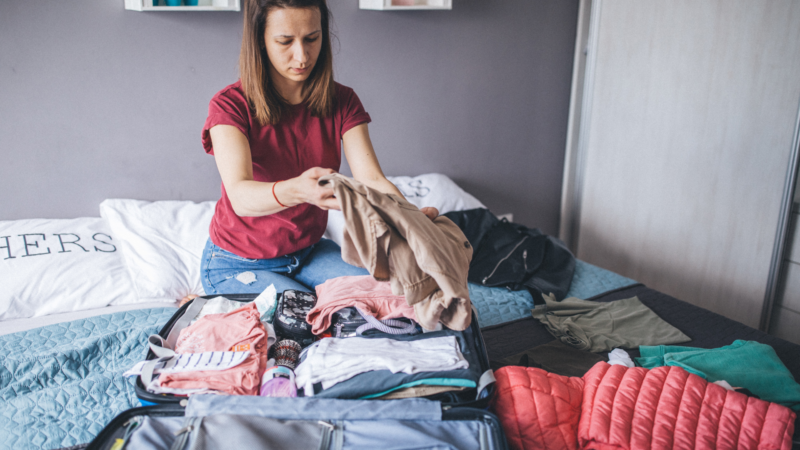What to Bring (and Leave Behind) on Your Travel Healthcare Assignment
As a healthcare traveler, packing efficiently can make or break your experience at a new assignment. Whether you’re a travel nurse, respiratory therapist, or any other traveling healthcare professional, knowing what to bring (and what to leave behind) is essential for a smooth transition. This comprehensive healthcare traveler packing guide will help you prepare for your next adventure without overpacking or forgetting crucial items.

Before You Pack
Before diving into our packing recommendations, keep these tips in mind:
- Check with your housing provider to confirm what’s already included in your accommodations
- Connect with your recruiter about any facility-specific requirements
- Research the location’s climate for the duration of your assignment
- Consider the length of your contract when deciding how much to bring
Room Essentials
Your temporary housing is your sanctuary after long shifts. Make it comfortable with these essentials:
- Bedding for standard/queen size bed (check with housing provider for size)
- Pillow(s) from home (an overwhelming favorite “must-have” item among travelers!)
- Throw blanket(s)
- Washcloths + towels
- Area rug (for comfort and noise reduction)
- Desk/floor lamp for additional lighting
- Storage bins or collapsible organizers
- Portable fan
- Curtains or blackout shades (tension rods only if renting)
- Room decorations (photos, small plants, etc. to make it feel like home)
- Removable hooks/Command strips
- White noise machine (especially for day sleepers)
- Travel alarm clock or smart device
“Pack special ‘homey’ items like pictures, candles, and favorite blankets to combat loneliness.” — L.P., RN
Kitchen Essentials
Even if you plan to eat out frequently, having basic kitchen supplies will save money and provide comfort:
- 2-4 plates + bowls
- Cups + mugs
- Silverware set
- Basic cookware (1 pot, 1 pan)
- Cooking utensils
- Food storage containers
- Travel mug or reusable water bottle
- Reusable grocery totes
- Basic spices and cooking oils
- Coffee maker or other must-have small appliance
- Dish soap and sponge
- Dish towels
- Zip-top bags and aluminum foil
Personal Care + Supplies
Maintaining your well-being is crucial for healthcare professionals working demanding shifts:
- Toiletries/hygiene items
- First aid kit with common medications
- Prescriptions + refills (or know local pharmacy options)
- Insurance cards and medical information
- Sufficient work uniforms/scrubs
- Clothing hangers + appropriate clothing for climate
- Laundry detergent + dryer sheets
- Laundry basket or bag
- Basic cleaning supplies
- Professional license and certification documents
- Employment documents
Electronics
Stay connected and entertained during your assignment:
- Computer + accessories
- Grounded 3-prong power strip
- Surge protector/extension cords
- TV + streaming device (if not provided)
- HDMI cable
- Headphones (noise-canceling recommended for shared housing)
- Phone charger (consider extras for work bag)
- Portable battery pack
- Small Bluetooth speaker
General Preparedness
Be ready for anything your assignment might throw at you:
- Backpack or work bag
- Stethoscope and personal medical equipment
- Notebook and pens
- Professional references or pocket guides
- Portable lunch bag/cooler
- Rain jacket
- Umbrella
- Appropriate shoes for weather conditions
- Reusable water bottle
- Small emergency kit (flashlight, batteries)
- Basic tool kit
- Debit/credit cards (notify banks of travel)
- Small safe for valuables
- Local maps or travel guides
What’s Often Provided (But Confirm First)
Many furnished housing options for healthcare travelers include:
- Bed frame + mattress
- Basic furniture (couch, chairs, dining table)
- Dresser or clothing storage
- Desk or work surface
- Basic kitchen appliances (refrigerator, microwave, stove)
- Waste baskets
- Basic window coverings
- Television (in some accommodations)
“You’ll find various levels of furnished housing, but always pay attention to details,” cautions Alexa F. When searching for accommodations on platforms like Furnished Finder, she recommends knowing your must-haves ahead of time. For her, amenities like a washer, dryer, and dishwasher are essential.
What to Leave at Home
Save space and avoid potential issues by leaving these behind:
- Excessive decor or large art pieces
- Items that require permanent installation
- Valuable or irreplaceable belongings
- Large appliances
- Extensive book collections (consider e-books instead)
- Full-sized luggage (store collapsible bags instead)
- Excessive clothing (pack for the season with laundry in mind)
“Pack light and only bring essentials. You’ll be surprised by how much you can live without.” — Alex, radiologic technologist
Packing Tips
- Pack in containers that can double as storage during your assignment
- Create a digital inventory of what you brought to each assignment to refine your packing strategy over time
- Ship bulky items directly to your housing rather than transporting them
- Invest in quality multi-purpose items that serve multiple functions
- Join local buy-nothing groups for temporary items you might need
Remember that each assignment is unique, and your packing needs will evolve with experience. Start with the essentials and adjust as you learn what works best for your travel lifestyle.
Read More: The Ultimate Guide to Travel Nurse Housing – Uniti Med – Everything you need to know about finding the perfect temporary housing
****
About Uniti Med: As a leading healthcare staffing company, Uniti Med is known for its outstanding culture and dedicated professionals. We specialize in travel nursing, locum tenens, and various healthcare sectors, fostering meaningful relationships with both our clients and employees. Recognized on multiple prestigious lists—including SIA’s 2024 Best Staffing Firms to Temp for and Best Staffing Firms to Work For—Uniti Med is committed to making a lasting impact in the healthcare industry. In 2024 Uniti Med joined the GQR.
Search Travel Jobs Now | Talk to a Recruiter
